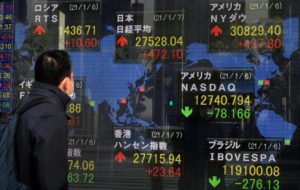MANILA, Philippines — Assistance to borrowers amid a prolonged pandemic through the Development Bank of the Philippines (DBP) will soon be available after the release of P12.5 billion to the state-run lender Friday.
Department of Budget and Management (DBM) documents showed the special allotment release order (Saro) covered the national government’s equity contribution to DBP’s wholesale banking, which in turn will cover loans and interest payments of beneficiaries badly hit by the Covid-19 crisis.
This financing facility formed part of the Bayanihan to Recover as One Act or Bayanihan 2 Law, whose validity had been extended up to June this year.
The DBM was able to release pending Bayanihan 2 funds since the law’s extension took effect on February 2.
For the part of the state-run Philippine Guarantee Corp. (PhilGuarantee), its president and chief executive Alberto E. Pascual told the Inquirer last week that they already submitted the documents required by the DBM to facilitate the release of P5 billion for its credit guarantee program, which will also be offered to large companies.
Besides DBP and PhilGuarantee, the Land Bank of the Philippines also had a pending equity infusion under Bayanihan 2 to offer low-interest loans.
In all, these three government financial institutions (GFIs) will be infused with a total of P39 billion in equity, Budget Secretary Wendel E. Avisado said last year.
The latest DBM data showed it released P109.2 billion out of the P140-165.5 billion in Bayanihan 2 funds before the law expired on Dec. 19, 2020.
Also on Friday, the Department of Finance (DOF) said in a statement that Landbank had set aside over P153 million to hire more than 1,000 service contract workers to help national ID registrants open bank accounts.
“Facilitating the opening of bank accounts for registrants to the Philippine identification system (PhilSys) will help ensure the speedy and efficient delivery of future government assistance programs to unbanked national ID holders,” Landbank president and chief executive Cecilia C. Borromeo was quoted by the DOF as saying.
The ongoing second step of national ID registration entailed biometrics capture in centers where Landbank personnel would co-locate to assist in opening transaction accounts.
The Philippine Statistics Authority (PSA) had said that of the 10.5 million registrants under step one or demographic data-collection conducted late last year, over 82 percent did not have bank accounts. Most of these initial registrants belonged to poor households in the country’s poorest provinces.


